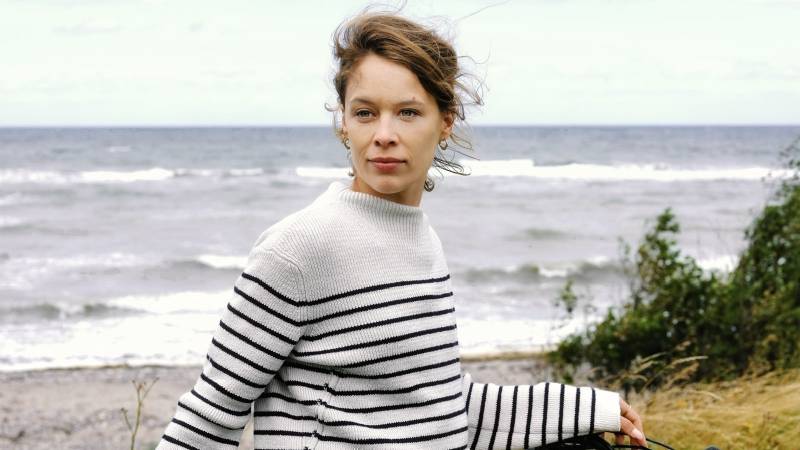Leon (Thomas Schubert) is a young writer on holidays with his art student friend Felix (Langston Uibel). They have travelled to Felix’s mum summerhouse on the German coast, near the city of Rostock. It’s summer, but Leon has little interest in the beach and partying; he’s more concerned about writing his latest novel. To his despair, the journey turns out to be far more complicated than they anticipated, with their car breaking down, and forest fires threatening to destroy roads and buildings. To top it all up, they have to share the house with a beautiful and mysterious a woman called Nadja (Paula Beer; the German actress is working with the director Christian Petzold for the third consecutive film, after 2018’s Transit and 2020’s Undine). She is the niece of a friend of Felix’s mother, and she is comfortably settled by the time the two males arrive.
Awkwardness prevails throughout Christian Petzold’s exquisite new creation. Leon is introspective, and he shudders at Felix’s and Nadja’s happy-g0-lucky, sexually liberated attitude. Super good-looking lifeguard Devid (Enno Trebs), with the perfectly chiseled body and angel face, soon joins the group, but Leon is unimpressed. There is a touch of sexual invidiousness in the air. Leon is a little chubby and not particularly attractive, or at least not confident about his appearance. The three others struggle to make Leon feel comfortable, and he increasingly withdraws into his shell, dropping the occasional anti-social bomb in the process. His friends challenge him to enjoy the moment – “look around yourself” – to little avail. He makes a couple of inadequate and even hurtful comments, and draws very rash and hasty conclusions about the others.

Leon’s publisher Helmut (Matthias Brandt) is due at visit at any moment, heightening our protagonist’s apprehension levels. The middle-aged and bespectacled man arrives in his small car and immediately bonds with the young people, increasing his client’s sense of alienation even further. Some very unexpected revelations are made during dinner. Not all was what it seemed. A conversation dotted with references to German writers is particularly insightful and revealing. The takeaways are clear as the daylight, even if you are not particularly familiar with German literature. Don’t judge a book by its cover. Don’t judge a person by their appearance. Don’t fall in love. Love is a foolish and selfish emotion.
The complex mind of the creative artist is the movie’s central pillar. Leon is insular and adroit. His verbal communications skills are awkward, in stark contrast to his flamboyant writing abilities. He lives in a parallel world, and fails to grasp some of the most basic rules of conviviality. There is a conflict between the colourful and liberating creation (Leon’s book) and the apathetic and captive creator (Leon). In fact, the writer is defined by this paradox. He has to misinterpret and subvert reality in order to concoct an original story, but he often collapses under the weight of the mission.
Sixty-two-year-old Christian Petzold, perhaps the biggest exponent of the Berliner Schule, has created a psychologically multilayered drama with enigmatic yet relatable characters, not entirely dissimilar to his previous movies. Afire is a philosophical and meditative film that uses literature as a gauge of very complex sentiments. It’s also accessible and intelligible. Despite a slow start, this is a movie that justifies its runtime, and its punch-in-the-face ending will stay with you for some time.
Afire is in cinemas across the UK on Friday, August 25th. On all major VoD platforms on October 28th. Also showing in the Best of Festivals section of the Tallinn Black Nights Film Festival, and at the 41st Turin Film Festival.








